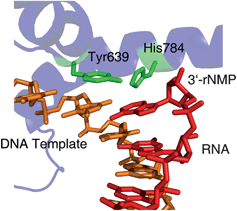A method for making modified RNA provides a new tool to study non-coding RNAs (functional RNA molecules not translated into a protein), say researchers from Germany and Austria.
Chemical synthesis of modified DNA and RNA is limited by size and by type of modification, so scientists are searching for new methods to overcome these limitations. To modify RNA, Ronald Micura and Andreas Marx and their teams used an enzyme – an RNA polymerase – rather than conventional synthesis methods.
Using the enzyme, the team was able to incorporate seleno modified ribonucleotides – useful for X-ray crystallographic studies of RNA – into RNA. The team do say that methods exist to do this, but they are limited by size – up to 100 nucleotides long – and are laborious, unlike Micura and Marx’s method, which can incorporate them into longer strands.
To find out more, read the Edge article.











